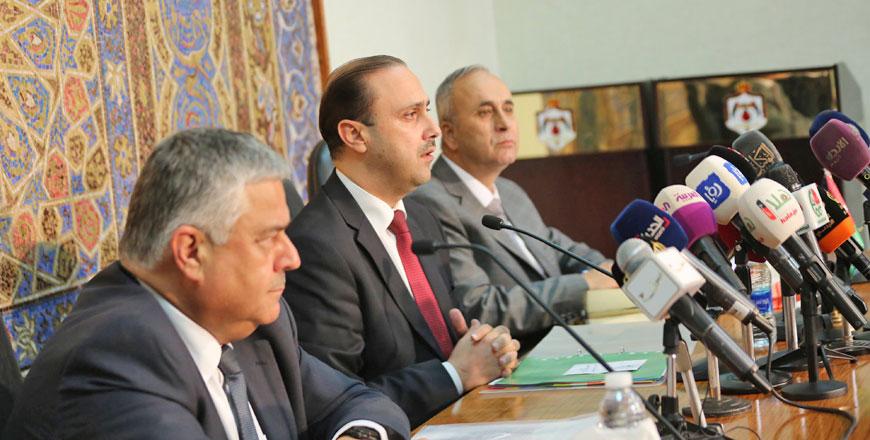You are here
Lawmakers say gov’t should not be left alone
By JT - Oct 10,2017 - Last updated at Oct 10,2017
AMMAN — A leading lawmaker on Tuesday said that the government should not be left to solely address the ailing economic situation, stressing that it is the responsibility of all to shoulder their shares of this responsibility.
Speaking at a meeting with Prime Minister Hani Mulki, Head of Lower House Wifaq Bloc MP Mazen Qadi stressed that the undesirable economic reality should not be blamed on the incumbent government alone, explaining that it is the outcome of policies implemented by all governments since 1989, the Jordan News Agency, Petra, reported.
He called for setting clear economic guidelines as the country moves ahead in addressing the crisis, urging stakeholders to be transparent with the public regarding any measure to be taken towards that end.
Mulki’s meeting with the bloc was part of an outreach drive to discuss options and clear confusion over the government’s next step, especially as reports based on leaked information and International Monetary Fund literature spoke of slashed income tax exemptions, while others have alleged that the government intends to raise the general sales tax, up to 22 per cent.
In all his recent meetings, Mulki made it clear that the income tax exemptions for individuals and families would not be touched, but the law would be revisited to improve collection and prevent tax evasion.
As for sales tax, the prime minister told lawmakers Tuesday that all subsidies would be reevaluated, reiterating that the government wants to make sure that such support only goes to Jordanians, in light of the fact that non-Jordanians constitute a third of the population.
Mulki outlined the main points of the national programme for financial and structural reform, which, he said, aims to enhance the resilience of economy, reduce public debt and the general budget’s deficit, and reach self-dependence.
Mulki noted that the measures of resilience require financial control, a firm financial policy and a clear plan to stimulate economic growth through supporting promising sectors.
The premiere stressed that although the Jordanian dinar is strong and the Central Bank of Jordan’s reserves are adequate, the Jordanian economy is facing challenges that require financial reform to salvage economy and enhance its resilience.
He noted that the Jordanian economy grew by 5.6 per cent between 2000 and 2009, then began to drop from 2009 until 2016, when it hit 2.5 per cent, due to the global economic crisis, the regional situation, the repercussions of the Syrian crisis, the closure of borders with Iraq and Syria and the disruption of Egyptian gas supply.
Related Articles
AMMAN — The Cabinet on Monday approved the mandating reasons for a draft law amending the Income Tax Law for 2018 and referred it to the Leg
AMMAN — Prime Minister Hani Mulki on Wednesday stressed the government's eagerness to extend the private sector's participation in the natio
AMMAN — Prime Minister Hani Mulki has said that all subsidised commodities are being currently under study regarding the sales tax, stressin
















